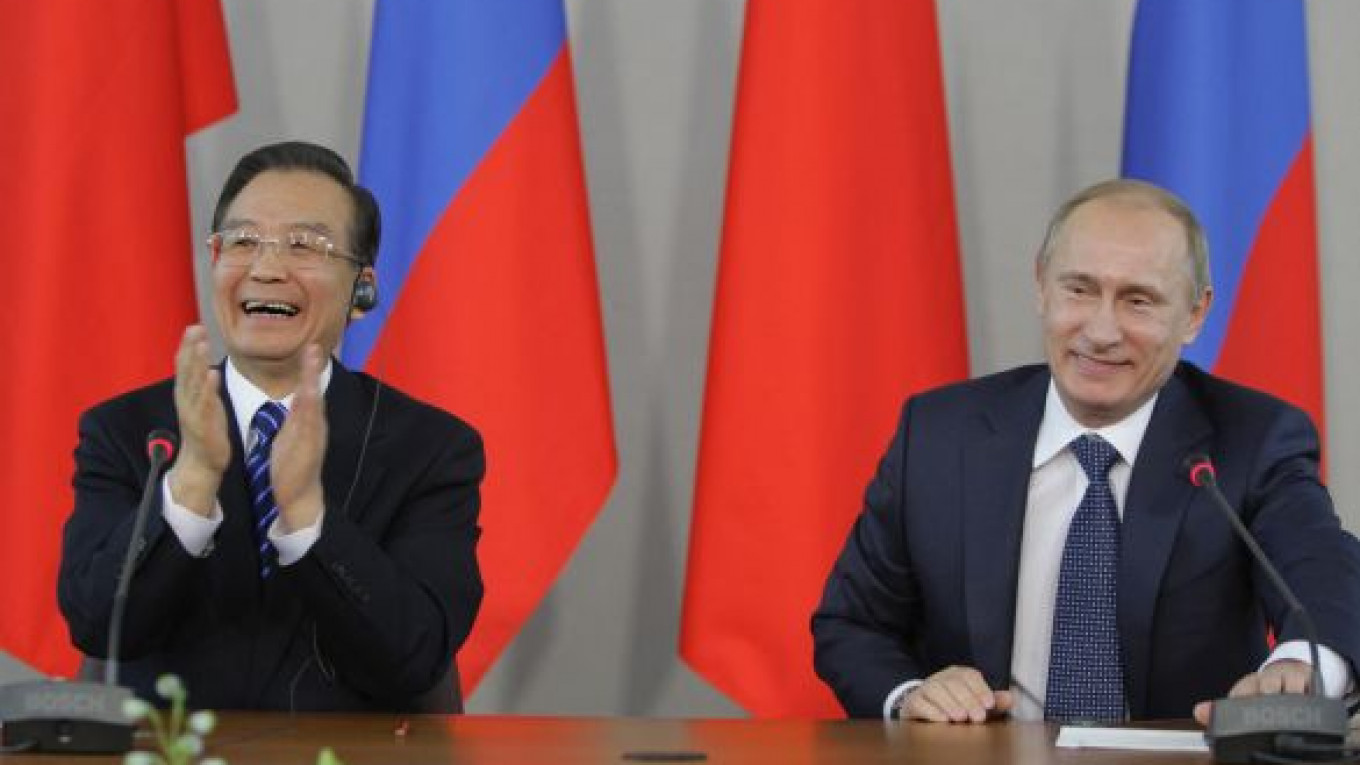Prime Minister Vladimir Putin said Tuesday that Russia and China had progressed in the negotiations on supplies of natural gas, though a final pricing agreement is not expected until next year.
“The talks between Gazprom and China National Petroleum Corporation on the prospects of supplies of Russian natural gas to China are going successfully,” Putin told reporters after a meeting with his Chinese counterpart, Wen Jiabao.
The two leaders met in Strelna, a suburb of St. Petersburg, to discuss mutual trade and the price of gas that will be supplied to China.
According to an agreement signed during President Dmitry Medvedev's visit to China earlier this year, Russia will supply a total of 30 billion cubic meters of gas to China annually starting in 2015 via the Altai gas pipeline, which connects Siberia and China's western border with Russia.
The two countries have been negotiating the final price of the gas since 2006, with China asking for a discount on the price that Russia charges European countries.
The sides will agree on the gas price no earlier than mid-2011, Deputy Prime Minister Igor Sechin said, reiterating the position announced earlier this year.
“The work is going in accordance with the plan, which stipulates signing certain accords and considering certain proposals as soon as in the middle of next year,” said Sechin, who also participated in the meeting.
The price gap between the Russian offer and what China wants is about $100 per 1,000 cubic meters, Gu Jun, deputy director-general of the international department at China’s National Energy Administration, said earlier this month.
Economic ties between Russia and China have become even stronger this year, Putin said.
“I have no doubts that we'll show results not worse than those before the crisis at the end of this year already,” he said.
Mutual trade between the two countries increased by 56 percent in the first nine months of the year to reach $42 billion, Putin said.
He also said Russia and China intended to develop business ties creating favorable conditions for mutual investments, adding that using national currencies in trade would facilitate the process.
The Bank of China and Industrial & Commercial Bank of China began ruble trading on Monday, with yuan trading on MICEX scheduled to start in December.
“It's a very serious step forward — from my point of view — in creating better conditions for development of trade and economic ties without any losses,” Putin said.
The sides are successfully partnering in a number of areas, including energy and nuclear power.
Putin reminded that construction of the Skovorodino-Daqing oil pipeline had been finished, with supplies starting on Jan. 1.
In the meantime, the cornerstone for an oil refinery plant in Tianjin, a joint enterprise between Rosneft and CNPC, has been laid, Putin said.
Russia and China signed a total of 11 documents during Putin's meeting with Wen, including an agreement to build the third and fourth units of the Tianwan nuclear power plant.
Atomstroiexport, a unit of Russia's nuclear power company Rosatom, will build the reactors, with a capacity of 1,060 megawatts each, Atomstroiexport said in a statement.
China's Jiangsu Nuclear Power Corporation will design the facility and supply part of the equipment, the statement said.
The sides declined to provide the investment cost of the project, but Interfax reported that it may be about 1.3 billion euros ($1.75 billion), citing a source.
A banking deal between Sberbank and Export-Import Bank of China, in which China opens a credit line of $2 billion for Russia, will be signed, Putin said.
The funds will be spent on “financing big joint economic projects,” Putin said, without elaborating.
Sberbank said in an e-mailed comment that it could not disclose any details before the contract was officially signed.
China agreed earlier this year to lend Russia about $6 billion in exchange for increased coal supplies over the next 20 years.
A Message from The Moscow Times:
Dear readers,
We are facing unprecedented challenges. Russia's Prosecutor General's Office has designated The Moscow Times as an "undesirable" organization, criminalizing our work and putting our staff at risk of prosecution. This follows our earlier unjust labeling as a "foreign agent."
These actions are direct attempts to silence independent journalism in Russia. The authorities claim our work "discredits the decisions of the Russian leadership." We see things differently: we strive to provide accurate, unbiased reporting on Russia.
We, the journalists of The Moscow Times, refuse to be silenced. But to continue our work, we need your help.
Your support, no matter how small, makes a world of difference. If you can, please support us monthly starting from just $2. It's quick to set up, and every contribution makes a significant impact.
By supporting The Moscow Times, you're defending open, independent journalism in the face of repression. Thank you for standing with us.
Remind me later.






